Every year in early autumn, the Netherlands Film Festival (NFF) takes place. For ten days, the city of Utrecht is the cinema capital of the Netherlands, and we join the fun with our own Unofficial Dutch Film Star Postcards Festival (UDFSPF). Today a film special about De Big van het regiment/The Darling of the Regiment (Max Nosseck, 1935), a First World War farce about the mobilisation of the Dutch Army.
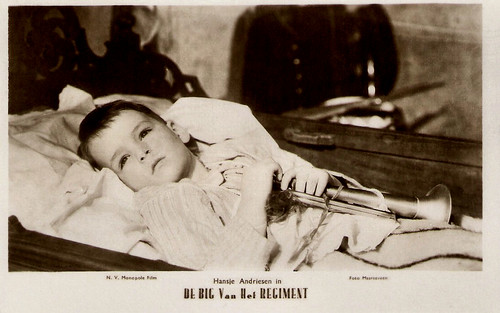
Dutch postcard by Monopole Film N.V. Photo: Dick van Maarseveen. Still for De Big van het Regiment/The Darling of the Regiment (Max Nosseck, 1935) with Hansje Andriesen. Collection: Geoffrey Donaldson Institute.
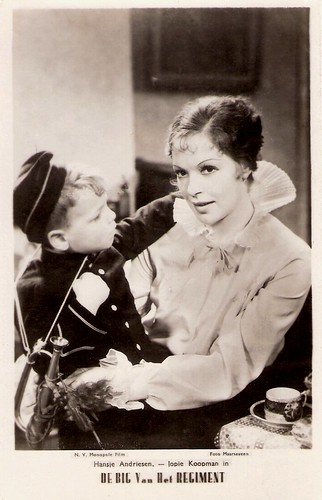
Dutch postcard by Monopole Film N.V., Rotterdam. Photo: Dick van Maarseveen. Publicity still for De Big van het regiment/The Darling of the Regiment (Max Nosseck, 1935) with Hansje Andriesen and Jopie Koopman.
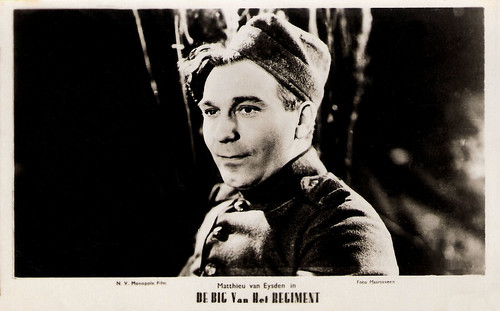
Dutch postcard by Monopole Film N.V.. Photo: Dick van Maarseveen. Publicity still for De Big van het regiment/The Darling of the Regiment (Max Nosseck, 1935) with Matthieu van Eysden. Collection: Geoffrey Donaldson Institute.
De Big van het regiment (1935) is a Dutch film directed by German film director, actor and screenwriter Max Nosseck (1902-1972). Nosseck was born in Nakel - then in Prussia, but now in Poland. Nosseck established himself as a director in the German film industry of the 1920s. Due to his Jewish background he was forced to emigrate following the Nazi takeover in 1933. He directed films in Spain, the Netherlands and United States. After the Second World War, he returned to work in the German and Austrian film industries.
The scenario of De Big van het regiment was written by Herman Bouber, author of the box office hit De Jantjes/The Tars (Jaap Speyer, 1934), and German refugee writer Arnold Lipp. Their script was based on the novel Spionage in het veldleger (Espionage in the field army, 1933) by Mr. Anton Roothaert. In 1915 many Belgian citizens flee to the Netherlands because of the First World War. Reserve lieutenant Berkhage (Frits van Dongen) is sent to the Dutch-Belgian border to keep order in the flow of refugees. He then gets a refugee child (Hansje Andriesen) pushed into his arms. Named 'Big' by the company, he is soon the regimental darling.
Star of the film was the Dutch matinee idol Frits van Dongen (1901-1975). He was born Hein van der Niet and from 1940 on, he was billed in Hollywood as Philip Dorn. Van Dongen made his stage debut at age 14 and by the mid-1930s, he was a popular film actor in the Netherlands. From 1937 on, he worked in Germany with the likes of Veit Harlan. When World War II broke out, he moved to Hollywood and acted in several films, starting with Enemy Agent (Lew Landers, 1940). He was usually cast as Continental lovers, anti-Nazi Germans or refugees. In the 1950s, he returned to Europe and acted in a few German films and in a Dutch stage play.
The cast of De Big van het regiment is a 'who is who' of the Dutch cinema of the 1930s. The main female roles are played by film and cabaret diva Fien(tje) de la Mar and by another pretty film and cabaret artist, Jopie Koopman. The regiment includes such well known stage and film stars as Adolphe Engers, Matthieu van Eysden, Sylvain Poons and Johan Kaart.
For the search for the child who could play the title role, an advertisement was placed in a newspaper. Producer N.V. Monopole Film received a tsunami of letters. The four-year old Hansje And(e)riesen from Amsterdam was chosen. On the set, the little boy was assisted by his mother. He did not have to memorise the scenario, but just before the shooting, he was told what to do.
The premiere of De Big van het regiment took place in the Tuschinski Theater, the wonderful, still existing Art Deco cinema in Amsterdam. Several of the players were present. The critics were very positive. Various media wrote about how confidence in the Dutch film - especially after the disaster of De familie van mijn vrouw/The family of my wife (Jaap Speyer, 1935) - was restored!
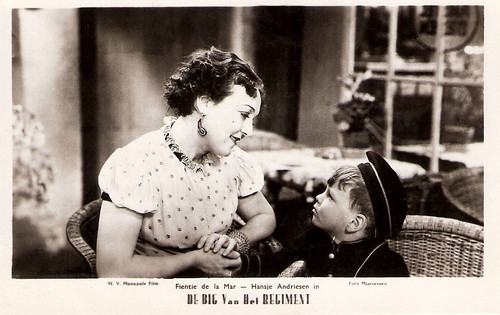
Dutch postcard by N.V. Monopole Film. Photo: Dick van Maarseveen. Fien(tje) de la Mar and Hansje Andriesen in De Big van het regiment/The Darling of the Regiment (Max Nosseck, 1935).
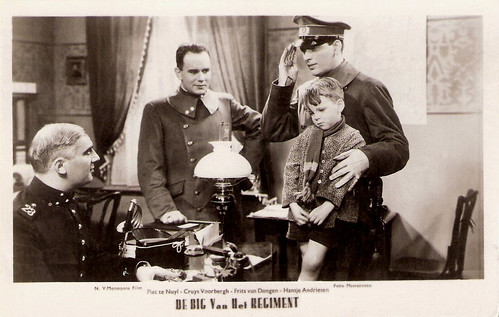
Dutch postcard by N.V. Monopole Film. Photo: Dick van Maarseveen. Still for De Big van het Regiment/The Darling of the Regiment (Max Nosseck, 1935) with Piet te Nuyl, Cruys Voorbergh, Frits van Dongen and Hansje Andriesen. Collection: Geoffrey Donaldson Institute.
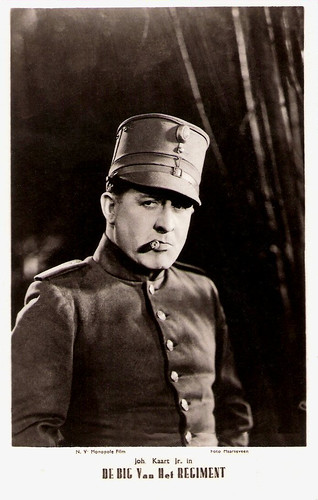
Dutch postcard by N.V. Monopole Film. Photo: Dick van Maarseveen. Publicity still for De Big van het regiment/The Darling of the Regiment (Max Nosseck, 1935) with Johan Kaart. Collection: Geoffrey Donaldson Institute.
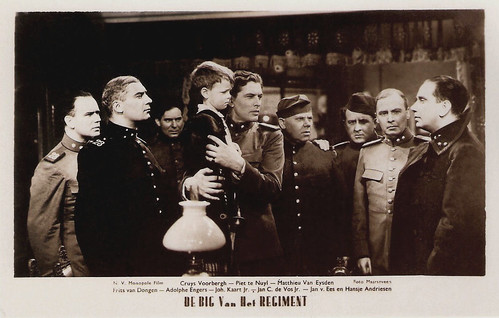
Dutch postcard by N.V. Monopole Film. Photo: Dick van Maarseveen. Still for De Big van het Regiment/The Darling of the Regiment (Max Nosseck, 1935) with Cruys Voorbergh, Piet te Nuyl, Matthieu van Eysden, Hansje Andriesen, Frits van Dongen, Adolphe Engers, Johan Kaart, Jan C. de Vos jr. and Jan van Ees. Collection: Geoffrey Donaldson Institute.

Dutch postcard by N.V. Monopole Film. Photo: Dick van Maarseveen. Still for De Big van het regiment/The Darling of the Regiment (Max Nosseck, 1935) with Johan Kaart, Sylvain Poons, Hansje Andriesen, Matthieu van Eysden, and Adolphe Engers. Collection: Geoffrey Donaldson Institute.
Sources: Wikipedia (Dutch and English) and IMDb.

Dutch postcard by Monopole Film N.V. Photo: Dick van Maarseveen. Still for De Big van het Regiment/The Darling of the Regiment (Max Nosseck, 1935) with Hansje Andriesen. Collection: Geoffrey Donaldson Institute.

Dutch postcard by Monopole Film N.V., Rotterdam. Photo: Dick van Maarseveen. Publicity still for De Big van het regiment/The Darling of the Regiment (Max Nosseck, 1935) with Hansje Andriesen and Jopie Koopman.

Dutch postcard by Monopole Film N.V.. Photo: Dick van Maarseveen. Publicity still for De Big van het regiment/The Darling of the Regiment (Max Nosseck, 1935) with Matthieu van Eysden. Collection: Geoffrey Donaldson Institute.
The confidence of the critics was restored
De Big van het regiment (1935) is a Dutch film directed by German film director, actor and screenwriter Max Nosseck (1902-1972). Nosseck was born in Nakel - then in Prussia, but now in Poland. Nosseck established himself as a director in the German film industry of the 1920s. Due to his Jewish background he was forced to emigrate following the Nazi takeover in 1933. He directed films in Spain, the Netherlands and United States. After the Second World War, he returned to work in the German and Austrian film industries.
The scenario of De Big van het regiment was written by Herman Bouber, author of the box office hit De Jantjes/The Tars (Jaap Speyer, 1934), and German refugee writer Arnold Lipp. Their script was based on the novel Spionage in het veldleger (Espionage in the field army, 1933) by Mr. Anton Roothaert. In 1915 many Belgian citizens flee to the Netherlands because of the First World War. Reserve lieutenant Berkhage (Frits van Dongen) is sent to the Dutch-Belgian border to keep order in the flow of refugees. He then gets a refugee child (Hansje Andriesen) pushed into his arms. Named 'Big' by the company, he is soon the regimental darling.
Star of the film was the Dutch matinee idol Frits van Dongen (1901-1975). He was born Hein van der Niet and from 1940 on, he was billed in Hollywood as Philip Dorn. Van Dongen made his stage debut at age 14 and by the mid-1930s, he was a popular film actor in the Netherlands. From 1937 on, he worked in Germany with the likes of Veit Harlan. When World War II broke out, he moved to Hollywood and acted in several films, starting with Enemy Agent (Lew Landers, 1940). He was usually cast as Continental lovers, anti-Nazi Germans or refugees. In the 1950s, he returned to Europe and acted in a few German films and in a Dutch stage play.
The cast of De Big van het regiment is a 'who is who' of the Dutch cinema of the 1930s. The main female roles are played by film and cabaret diva Fien(tje) de la Mar and by another pretty film and cabaret artist, Jopie Koopman. The regiment includes such well known stage and film stars as Adolphe Engers, Matthieu van Eysden, Sylvain Poons and Johan Kaart.
For the search for the child who could play the title role, an advertisement was placed in a newspaper. Producer N.V. Monopole Film received a tsunami of letters. The four-year old Hansje And(e)riesen from Amsterdam was chosen. On the set, the little boy was assisted by his mother. He did not have to memorise the scenario, but just before the shooting, he was told what to do.
The premiere of De Big van het regiment took place in the Tuschinski Theater, the wonderful, still existing Art Deco cinema in Amsterdam. Several of the players were present. The critics were very positive. Various media wrote about how confidence in the Dutch film - especially after the disaster of De familie van mijn vrouw/The family of my wife (Jaap Speyer, 1935) - was restored!

Dutch postcard by N.V. Monopole Film. Photo: Dick van Maarseveen. Fien(tje) de la Mar and Hansje Andriesen in De Big van het regiment/The Darling of the Regiment (Max Nosseck, 1935).

Dutch postcard by N.V. Monopole Film. Photo: Dick van Maarseveen. Still for De Big van het Regiment/The Darling of the Regiment (Max Nosseck, 1935) with Piet te Nuyl, Cruys Voorbergh, Frits van Dongen and Hansje Andriesen. Collection: Geoffrey Donaldson Institute.

Dutch postcard by N.V. Monopole Film. Photo: Dick van Maarseveen. Publicity still for De Big van het regiment/The Darling of the Regiment (Max Nosseck, 1935) with Johan Kaart. Collection: Geoffrey Donaldson Institute.

Dutch postcard by N.V. Monopole Film. Photo: Dick van Maarseveen. Still for De Big van het Regiment/The Darling of the Regiment (Max Nosseck, 1935) with Cruys Voorbergh, Piet te Nuyl, Matthieu van Eysden, Hansje Andriesen, Frits van Dongen, Adolphe Engers, Johan Kaart, Jan C. de Vos jr. and Jan van Ees. Collection: Geoffrey Donaldson Institute.

Dutch postcard by N.V. Monopole Film. Photo: Dick van Maarseveen. Still for De Big van het regiment/The Darling of the Regiment (Max Nosseck, 1935) with Johan Kaart, Sylvain Poons, Hansje Andriesen, Matthieu van Eysden, and Adolphe Engers. Collection: Geoffrey Donaldson Institute.
Sources: Wikipedia (Dutch and English) and IMDb.
No comments:
Post a Comment